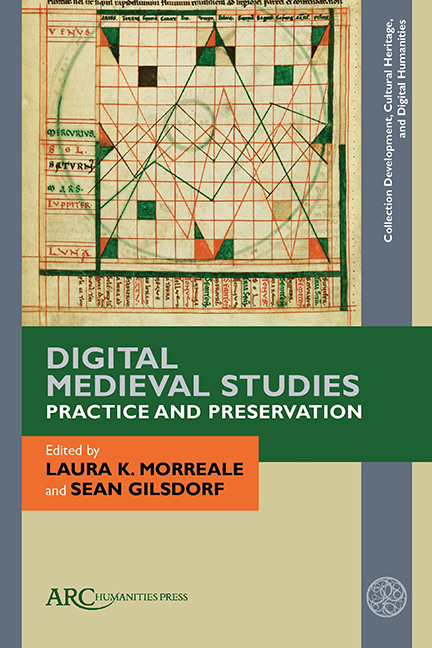Book contents
- Frontmatter
- Contents
- List of Illustrations
- Introduction: The Medievalist, Digital Edition
- Chapter 1 Beginnings: The Labyrinth Medieval Studies Website
- Chapter 2 New Approaches to Old Questions: Digital Technology, Sigillography, and digisig
- Chapter 3 Corpus Synodalium: Medieval Canon Law in a Digital Age
- Chapter 4 Teaching Constantinople as a (Pixelated) Palimpsest
- Chapter 5 Life on—and off—the Continuum
- Appendix: Permanent Links to the Catalogued Assets of Profiled Projects
- Index
Chapter 1 - Beginnings: The Labyrinth Medieval Studies Website
Published online by Cambridge University Press: 07 October 2022
- Frontmatter
- Contents
- List of Illustrations
- Introduction: The Medievalist, Digital Edition
- Chapter 1 Beginnings: The Labyrinth Medieval Studies Website
- Chapter 2 New Approaches to Old Questions: Digital Technology, Sigillography, and digisig
- Chapter 3 Corpus Synodalium: Medieval Canon Law in a Digital Age
- Chapter 4 Teaching Constantinople as a (Pixelated) Palimpsest
- Chapter 5 Life on—and off—the Continuum
- Appendix: Permanent Links to the Catalogued Assets of Profiled Projects
- Index
Summary
THIS CHAPTER DESCRIBES the origin, development, and significance of the Labyrinth—the first Medieval Studies website, as well as the first such site devoted to the Humanities—from its conception in 1992 to the present day. While the Labyrinth is still a living website as of the time of this publication (available at http://labyrinth.georgetown.edu), its story is one as old as the web itself. And, like the web itself, the story of the Labyrinth involves complex sets of connections and collaborations. There have been many, many contributors, both direct and indirect, to the success and value of the Labyrinth and its resources. The pages that follow are an attempt, admittedly incomplete, to chronicle those connections, and the complicated process by which they created a new tool for scholarly collaboration and creation. We encourage others to document the history of other electronic resources, and use this chapter to help them weave an even richer tapestry of scholarly history.
The Beginning
In the spring of 1992, Deborah Everhart had become increasingly excited about the opportunities for connecting the work of medieval scholars using the many networking technologies that were becoming more widely available, including the nascent World Wide Web. In a letter to a friend on March 4, 1992, she wrote, “I couldn't stop thinking about the networking we were discussing … professors of literature might be a key target … The time is right now.”1 The email went on to describe what this network (which she suggested naming “The Labyrinth”) might include: online journals, works in progress forums, conference listings, job lists, literature servers, image servers, music servers, a dictionary of literary terms; “the possibilities are endless,” she wrote, “and I think the profession is ripe for the switch to networking.” She was certain not only that the network could be built, but that it could be on line before the May 1994 meeting of the International Congress on Medieval Studies in Kalamazoo.
In October 1992, Deborah met Martin Irvine at the Medieval Academy's Committee on Centers and Regional Associations (CARA) meeting at Stanford University, where it became clear that numerous people (including Martin) were creating technology-rich projects ready for the kind of collaboration and integration that she had been envisioning.
- Type
- Chapter
- Information
- Digital Medieval Studies - Practice and Preservation , pp. 11 - 32Publisher: Amsterdam University PressPrint publication year: 2022



